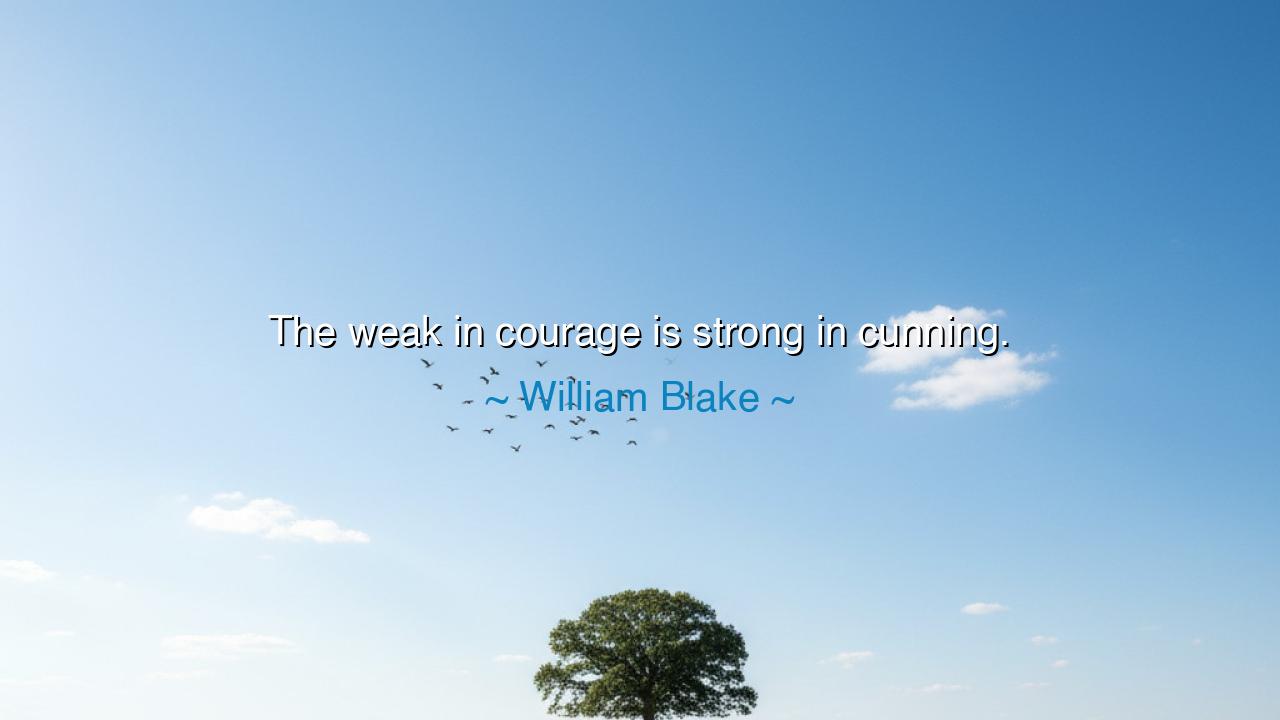
The weak in courage is strong in cunning.






“The weak in courage is strong in cunning.” Thus wrote William Blake, the poet-prophet of England, whose visions pierced through the illusions of men and touched the eternal struggles of the soul. In this brief yet profound statement, Blake reveals a truth as old as human nature itself—that when courage falters, the spirit does not become still, but turns to cunning as its refuge. The man who lacks the bravery to act openly will seek safety through deception; the one who fears the sword will sharpen his tongue. For weakness does not always yield surrender—it often breeds subtlety, calculation, and manipulation, as the timid seek through wit what they cannot win through valor.
Blake lived in an age of great upheaval—the dawn of industrial power, the rise of revolutions, and the decay of old faiths. He saw men enslaved not only by kings and machines, but by their own fears. He knew that courage is the foundation of virtue, and that when it collapses, the soul twists upon itself, seeking new means of survival. His words are not merely a warning, but an observation drawn from the depths of human behavior: where there is no courage, there will be cunning. Just as the fox replaces the lion when the roar is lost, so the fearful man hides behind schemes and pretenses, gaining through trickery what he dares not seize through truth.
This truth has echoed through history in the deeds of both the cowardly and the clever. Consider Cassius, the conspirator in Shakespeare’s Julius Caesar. Unable to face Caesar in open defiance, he wove webs of deceit, whispering into Brutus’s ear, stirring his doubts, and turning brother against brother. His cunning was sharp, his heart hollow of courage. And though his schemes triumphed for a moment, they soon collapsed under the weight of their own deceit. For cunning may win battles, but it cannot sustain empires; it is a weapon of survival, not of greatness. The courageous build, but the cunning only maneuver.
Yet Blake’s wisdom is not meant to scorn intelligence. Cunning, in its pure form, is not evil—it is the shadow of courage. It arises when fear grips the heart and the spirit, unwilling to fight, seeks safety in intellect. The mouse escapes the hawk not by strength, but by swiftness of thought. The oppressed, denied the power of arms, learn to survive through subtlety and silence. There are times, indeed, when cunning is the only armor of the weak. But Blake reminds us that it is a defensive wisdom, born not of greatness but of necessity. The truly noble soul uses reason not to deceive, but to illuminate.
The difference between courage and cunning lies in their purpose. Courage is open—it acts in the light, guided by truth and conviction. Cunning hides—it operates in shadow, driven by fear and self-preservation. The courageous man risks loss to uphold what is right; the cunning man risks his honor to protect his comfort. Both may achieve victory, but only one achieves dignity. The world remembers those who stood boldly in the storm, not those who hid behind the curtain. Thus, Blake’s words serve as both mirror and measure: they reveal how far we may fall from greatness when fear masters us.
Consider the life of Mahatma Gandhi, whose strength was not in sword or stratagem, but in moral courage. Faced with the might of an empire, he refused to fight through deceit or violence. His truth was open, his courage unyielding. The British mocked his simplicity, yet in that simplicity was a power greater than their cunning. Through courage, he disarmed the cleverness of the oppressor; through steadfastness, he conquered without striking a blow. His life stands as proof that the path of courage bears fruit that cunning never can—the fruit of freedom, peace, and honor.
Therefore, let this be the lesson for all who walk the path of wisdom: fear breeds cunning, but faith breeds courage. When you are tempted to scheme, to hide, to twist truth for safety’s sake—pause, and listen to the voice within. It will tell you that no victory gained by deceit is worth the price of self-betrayal. Cultivate courage, for it is the root from which all noble things grow. Be honest, even when honesty costs; be brave, even when bravery wounds; be steadfast, even when the world mocks. For as William Blake teaches, the soul that chooses courage may suffer, but the one that hides in cunning withers in its own shadow. The brave live in light; the cunning, forever in twilight. Choose, then, not the cleverness of fear—but the majesty of courage.






AAdministratorAdministrator
Welcome, honored guests. Please leave a comment, we will respond soon